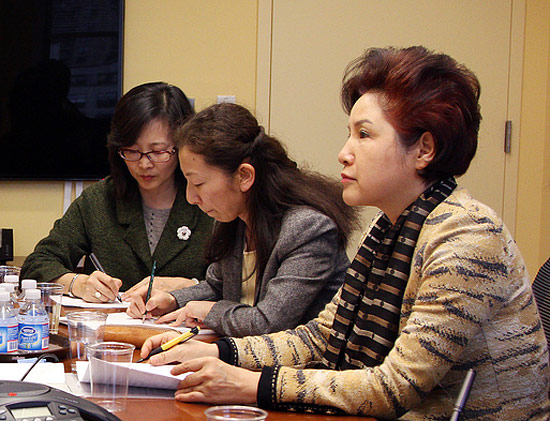Business Culture: Women in Business
China's cultural traditions have colored almost every aspect of this hierarchical society for centuries. One of the most important influences on Chinese thinking was Confucianism, with its emphasis on social order. According to the teachings of this philosophical system, everybody has a position and role to fill. For women, this was primarily as caretakers of the home and family. Although the advent of Communism changed much of the society's views, many of the core principles still affect Chinese customs and practice. For example, under Confucianism, women were considered more as possessions rather than people—objects that could be traded or sold to other households when necessary. The Cultural Revolution brought about sweeping changes designed to transform, among other things, the way society viewed women. Despite its efforts, however, practices such as "daughter selling” still exist in some rural areas. In the business arena, however, you will generally be treated with the respect due your position.
Public Presence
One positive change that emerged from the societal turmoil of the twentieth century was the freedom of women to move about in almost any setting. Back in the days when foot-binding was widely practiced among upper-crust females, women were physically unable to move far beyond their homes. Nowadays, women of all classes occupy the same general spaces as men. Although some differences exist, depending on the region and the ethnic group involved, in most cities you will see women working side-by-side with men, sharing the same spaces on public transportation, and basically interacting as equals.
Women are also free to dress as they choose, although the culture does tend to frown on women who dress in ways that are traditionally considered immodest. These include wearing bikinis, miniskirts, halter tops, and so on. While there is no legal restriction against wearing such garments, and you may even see some Chinese outfitted in them on occasion, society tends to frown upon such displays of the body in public. On the streets you will most often see women dressed in fashions that resemble casual wear in North America. Younger women often wear jeans, capris, slacks, or skirts accompanied by a t-shirt or sleeved blouse. Older women frequently wear loose-fitting trousers and a loose-fitting sleeved blouse. The Chinese wear a wide variety of colors, but anything overly flashy is relatively uncommon. For business meetings, wear conservatively cut suits in somber colors, elegant blouses, and understated jewelry and makeup. Avoid wearing heels, which can make you tower over your host and imply superior status. Choose clothing in natural fibers which will "breathe" better in more humid areas.
You are free to travel with companions of either gender when moving about China. For safety reasons, though, it is advisable to avoid traveling alone.
Personal Interaction
The Chinese usually stand about an arm’s length away from someone they are just meeting. After a relationship is established, the distance closes to about half an arm's length. Chinese men usually greet women with a handshake or a nod of the head. Touching is rare between the genders unless there is a family connection or the relationship has moved to one that is more romantic in nature. The Chinese favor direct eye contact when conversing, although they may lower the head slightly when speaking to an elder, out of respect for his or her status. Your status in your company will determine the amount of respect afforded you by your Chinese counterparts, though you will be expected to speak directly with people of similar status and defer to those of superior rank.
In most areas of China, women are seen as equals with men in regard to having their own ideas, opinions, and emotions. They are treated as people rather than property, at least in the major cities and regions. As mentioned earlier, however, this is not always true in some rural areas where older traditions and customs still exert a lot of influence. Nor do men always value a woman’s ideas and thoughts as much as a man’s. Despite laws that promote gender equality and the progress that women have made in this regard over the last century, China is still a male-dominated society where women are believed to be mothers and homemakers first and career women second.
Autonomy and Leadership
Chinese women have the same freedom of movement as men do in regard to applying for passports and traveling domestically and internationally. Women can own their own businesses and property, although access to land is difficult for everyone. Women still have limited political empowerment or leverage to gain positions in senior management, though. China is also one of the countries with an abnormal gender ratio, possibly caused by sex-selective abortions, female child abandonment, or infanticide. While in China on business, you should feel free to negotiate, sign contracts, supervise a workforce, and delegate responsibility to the extent that your position requires.
Article written for World Trade Press by John E. Roper.
Copyright © 1993—2025 World Trade Press. All rights reserved.

 China
China 